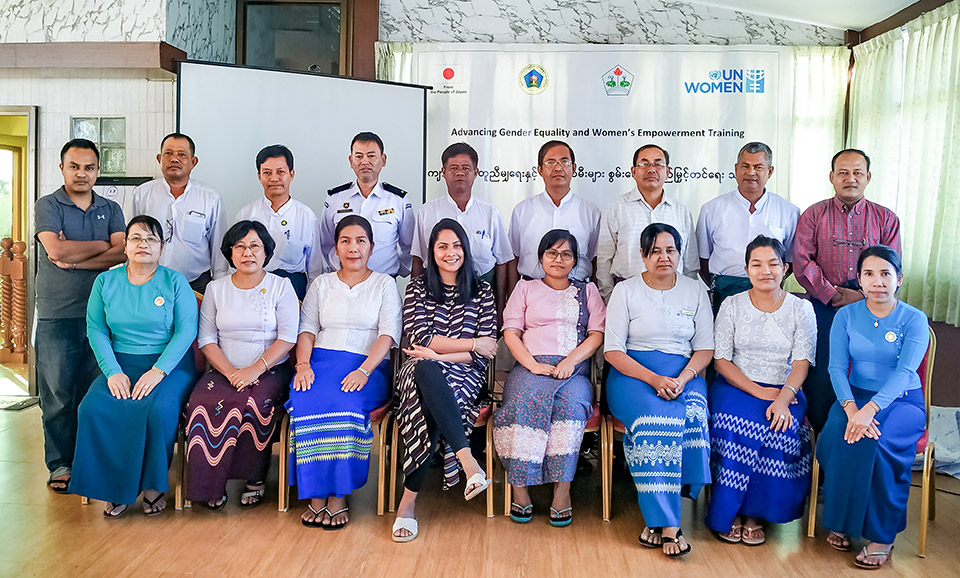Public servants in Myanmar learn how to better serve women and girls in the communities
Date:
Rakhine, Myanmar — UN Women has been supporting the Government of Myanmar’s National Strategic Plan for the Advancement of Women for 2018-2022 by training public servants on how to best meet women’s needs and rights in Rakhine State.
A team of foreign and local gender experts guided a total of 158 public servants in learning how to be more responsive to gender concerns and how to implement the National Strategic Plan at the local level.
The trainings were done in collaboration with the Department of Social Welfare; there were two rounds of two weeks each, held in the state capital Sittwe and in Mrauk U township, in November 2018 and February 2019. The participants came from the Rakhine Department of Social Welfare and the Women’s Committees in Sittwe, Mrauk U and two other townships – Pauktaw and Ponnagyun. The interdepartmental Women’s Committees were set up by the Government to coordinate implementation of the National Strategic Plan.

Women have limited representation across levels of government in Myanmar. This training – the first of its kind – aimed to ensure that township-level government departments are able to properly respond to the needs of all women and girls in Rakhine State.
“State and regional committees on women need to know basic gender concepts and Myanmar’s gender equality commitments in order to implement gender-responsive programmes and to consider women’s issues when planning and budgeting,” said Naw Tha Wah, Director of the Women’s Development Division at the Department of Social Welfare. “Then, they will be able to communicate the right message to their communities and implement programmes for the development and protection of women in the best possible way.”
Participants in the first training discussed the ways in which gender inequality and discrimination can limit women’s participation in decision-making in both public and private domains, and they brainstormed ways to overcome such constraints.

The participants explored gender equality and women’s empowerment issues in Rakhine State through discussions and interactive games. They gained insight on national and international conventions and frameworks, including the National Strategic Plan and the United Nations Convention on the Elimination of All Forms of Discrimination against Women which the Government of Myanmar acceded to in 1997. They discussed issues including citizenship, the right to intercommunal marriage, and harmful social and gender norms – topics that inspired many to share their personal stories.
For some, it was the first time they had been encouraged to apply the policy frameworks to their own lives and work, including by making more gender-responsive the community livelihood and health programmes that they run.
“I think this training has been very important,” said U Hla Win, a police officer from Pauktaw Township. “There is gender inequality in our country and women in particular are not treated equally to men. I will apply the knowledge I gained today in my work and I will help spread it in society.”
U U Nu Kyaw, a township-level officer with the Department of Social Welfare in Pauktaw, referred to the international gender equality and empowerment standards that he learned, and said he would draw on the training in his work, particularly when he witnesses instances of inequality and discrimination.
The trainings revealed that more work needs to be done to ensure that Women’s Committee members can fully implement the National Strategic Plan. More awareness and skills upgrades are needed across all departments and ministries. UN Women Myanmar will continue to work with the Government and other partners to ensure that these steps are taken and National Strategic Plan can be effectively implemented at every level.
The trainings are part of Inclusive Development and Empowerment of Women in Rakhine State, a joint programme of United Nations Development Programme and UN Women Myanmar. The Government of Japan funds the joint programme.